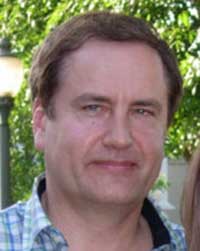Alexander Bratkovsky
 Biography
BiographyDr. Alex Bratkovsky is a Principal Scientist in the Quantum Science Research Lab at Hewlett-Packard in Palo Alto, CA. He received his Ph.D. in 1982 at the Kurchatov Institute for Atomic Energy in Moscow in the field of Theoretical and Mathematical Physics with a thesis on the electronic structure and thermodynamics of liquid and amorphous metals. He left Moscow in 1990 and spent six years at Cambridge and Oxford Universities (UK), where he continued his research on metals and alloys, especially structural phase transitions, spin transport in metal multilayers, metal-insulator transitions, and superconductivity. He joined HP in 1996 and carried out a broadly based research program on applications of electron transport, molecular electronics, ferroelectrics, spintronics, and negative index materials. He has given five invited talks at recent international conferences, filed over 50 U.S. patents (15 granted), and published regularly in APS and AIP journals (including 5 articles in PRL over the last 5 years). In 2005, Alex became an APS fellow nominated through FIAP for his “contributions to the theory of magnetoresistance and spin injection and design of electronic and spintronic nanodevices”.
Statement
As an elected FIAP officer, I intend to emphasize the following areas:
- Promoting networking and collaboration in developing and interdisciplinary topics between industry, national labs, and academia, with a focus on possible “next big things” where involvement of physicists is or could become crucial.
- Giving applied physics topics in industry, government, and universities a platform of attractive FIAP meeting programs for disseminating their results and attracting collaboration.
- Support and recognition of industrial and applied physicists with fellowship, prizes, and invited talks. Increase awareness of crucial importance of industrial research, including basic studies, which is under increasing pressure.
- Review activities for NSF and major physics journals, especially given a declining level of peer reviewing and onlooker position of the boards.
